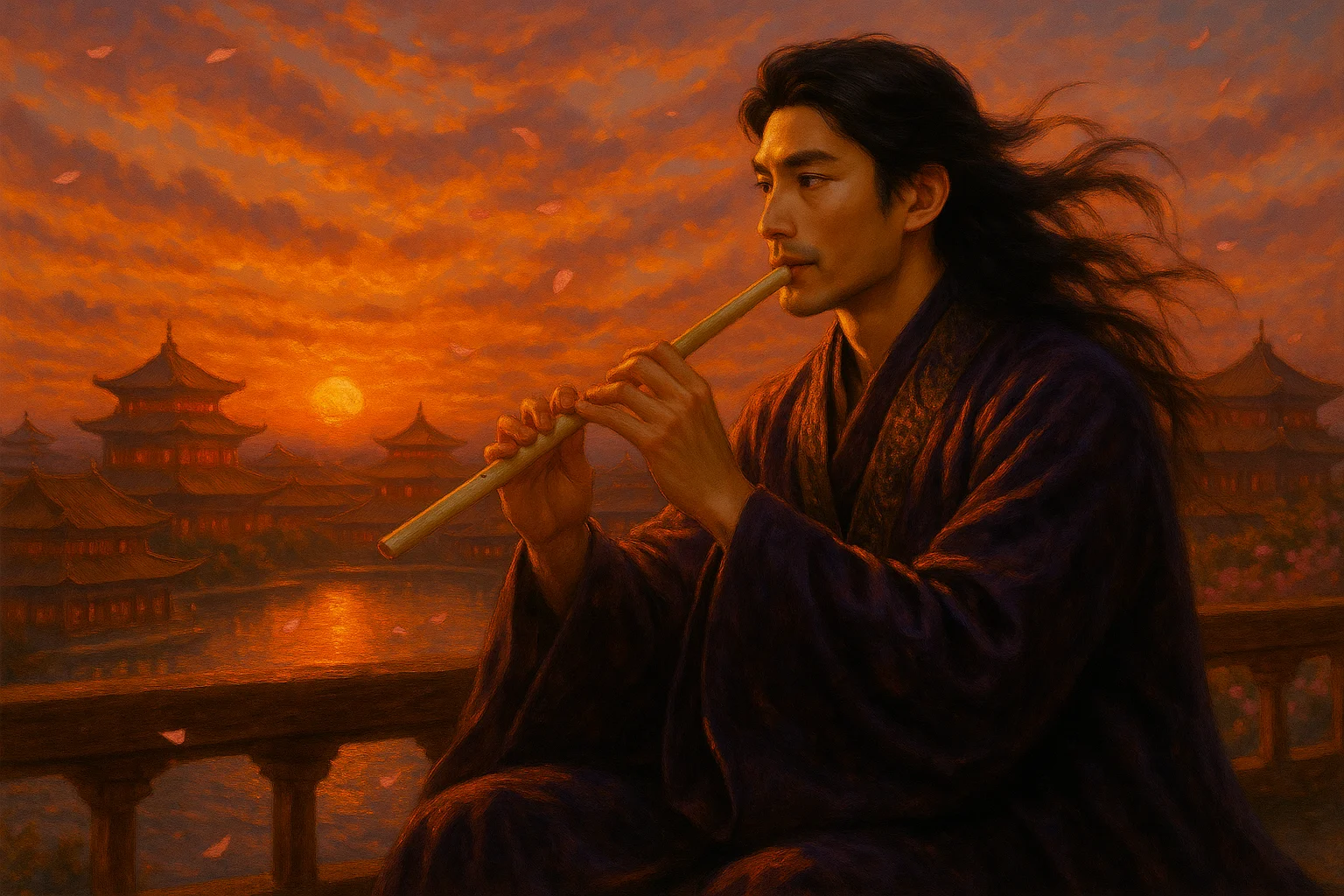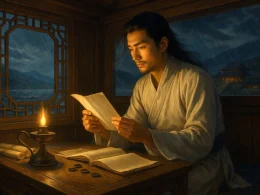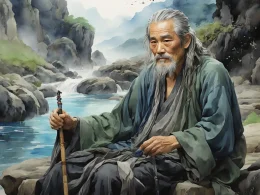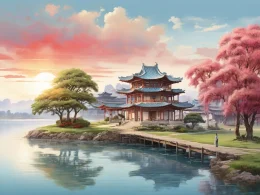The east wind blows willow trees green;
Light mist parts after rain, the sky’s serene.
Annoyed by her sweet sleep in fragrant bower,
The orioles warble at the morning hour.
Her eyebrows fine,
Her waist like a vine,
She wears last night’s attire.
Spring’s sweet desire,
The breeze of March so warm,
All waken love’s alarm.
Original Poem
「诉衷情 · 东风杨柳欲青青」
东风杨柳欲青青。烟淡雨初晴。
恼他香阁浓睡,撩乱有啼莺。眉叶细,舞腰轻。宿妆成。
晏殊
一春芳意,三月和风,牵系人情。
Interpretation
This lyric was composed during the early Northern Song Dynasty when Yan Shu, already a prominent statesman, stood at the pinnacle of both literary and political circles. As a leading figure of the "Northern Song ci poetry school," he excelled in depicting delicate emotions, particularly spring scenes, boudoir yearnings, and the transience of youth. Emerging from this cultural milieu, the poem—though lacking specific temporal markers—uses imagery like east winds, willow catkins, orioles' songs, and last night's makeup to evoke late spring, portraying a woman's melancholic languor on a spring morning. Through her dream interruptions and drowsy toilette, the poet expresses both spring-induced sentiments and lingering inner thoughts, reflecting both lament for fading beauty and the Song dynasty's refined aesthetic of subtle profundity.
First Stanza: "东风杨柳欲青青。烟淡雨初晴。恼他香阁浓睡,撩乱有啼莺。"
Dōngfēng yángliǔ yù qīngqīng. Yān dàn yǔ chū qíng. Nǎo tā xiāng gé nóng shuì, liáoluàn yǒu tí yīng.
East winds tease willows toward emerald hue, / As mist thins after rain's cessation. / Annoyed in her perfumed chamber— / Deep sleep shattered by orioles' chaotic trilling.
The opening paints a radiant early spring tableau—gentle winds, rain-washed willows, clearing mist—yet the woman remains oblivious, "annoyed" in her "deep sleep." The orioles' song, typically a spring delight, becomes an unwelcome disruption, creating poignant tension between scene and sentiment through abrupt yet nuanced emotional transition.
Second Stanza: "眉叶细,舞腰轻。宿妆成。一春芳意,三月和风,牵系人情。"
Méi yè xì, wǔ yāo qīng. Sù zhuāng chéng. Yī chūn fāng yì, sān yuè héfēng, qiān xì rén qíng.
Willow-leaf brows delicate, / Dancing-waist slender— / Last night's makeup still adorning. / All spring's fragrant intentions, / March's tender breezes, / Become threads tugging at human hearts.
Shifting from landscape to figure, the stanza mirrors willows' grace in the woman's "willow-leaf brows" and "slender waist," blending object description with human portrayal. Her unchanged "last night's makeup" signals listless melancholy. The closing triplet reveals the theme—spring's fragrances, warm winds, and willow tendrils all embody her quiet yearning, with emotion flowing seamlessly from seemingly artless spring imagery.
Holistic Appreciation
The first stanza of this lyric poem employs scenery to衬托 emotion, with delicate hues and subtle sentiment; the second shifts from scene to character, portraying the woman with vivid restraint. While depicting lush spring beauty, the poem avoids joyous tones, instead showing how the season stirs the woman’s melancholy—her quiet怨 at willows, her恼 at orioles’ songs. Her image is gentle and composed, never voicing离别 sorrow yet suffused with unspoken愁, epitomizing the wanyue (婉约) elegance of Song lyrics. The poet uses willow tendrils’ clinging nature to mirror human attachment, seamlessly blending nature and emotion like misty waters brimming with feeling—a tender, lingering effect that conveys spring’s wistfulness while showcasing profound psychological depth.
Artistic Merits
- Emotion Through Scenery, Feeling Within Image: With east wind, willows, misty rain, and orioles as central motifs, emotion flows subtly through the landscape, exemplifying the wanyue school’s artistry.
- Fusion of Object and Human: Eyebrow-like leaves and dancing waists mirror willow branches, merging subject and object to animate the imagery.
- Refined, Understated Language: Concise phrasing, bright yet soft tones, and delicate意境 shine in lines like "last night’s makeup still lingering" and "binding human hearts," blending realism with deep sentiment.
- Allusion Mastery: Echoing "Spring Lament" and "Boudoir Resentment" poetry, it absorbs classical motifs invisibly, achieving "spirit without trace."
Insights
This poem reveals Northern Song poets’ skill in crafting emotional atmospheres through nuanced nature depictions, particularly Yan Shu’s unique touch in portraying feminine melancholy with graceful restraint. It teaches us: truly moving lyricism lies not in explicitness but implication; harmony between feeling and scenery, human and object, is classical aesthetics’ essence. This "veiled yet vivid" emotional expression inspires us to observe inner worlds and natural wonders with greater delicacy and grace.
Poem Translator
Xu Yuanchong (许渊冲)
About the Poet

Yan Shu (晏殊 991 – 1055) Originaire de Fuzhou dans le Jiangxi, Yan Shu fut le maître fondateur de l'école wanyue (élégante et retenue) de la poésie ci sous les Song du Nord. Enfant prodige entré dans l'administration à quatorze ans, ses ci allient noblesse classique et méditation philosophique dissimulée sous des évocations de prospérité raffinée. Mentor de talents comme Fan Zhongyan et Ouyang Xiu, il initia l'École du Jiangxi en poésie ci et posa les bases de l'épuration du genre sous les Song.












